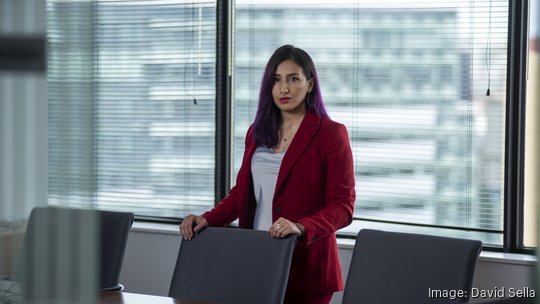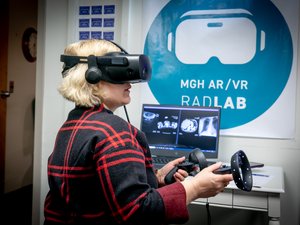
As an undergraduate student at MIT, Elaheh Ahmadi worked on some cool technologies in areas like robotics and aerospace. But through this work, she felt like the direct social impact was hard to see.
Ahmadi went on to complete her graduate degree in electrical engineering and computer science at MIT. While working with Professor Daniela Rus and Alexander Amini, who received his Ph.D. at MIT, Ahmadi began developing a de-biasing algorithm for artificial intelligence. She quickly started to see the impact this technology could have in areas like healthcare and autonomous vehicles.
“Within algorithms, it would automatically detect what are some sources of bias and then during training, it would make sure that the model is being trained in a de-biased way, meaning that your model is actually invariant or robust to a set of risk sources such as bias within the data,” Ahmadi said. Originally from Tehran, Iran, Ahmadi was named to BostInno’s 25 under 25 list in 2022.
In 2021, Ahmadi co-founded Themis AI with Amini and Rus to further this technology for enabling more trustworthy AI. Today the company announced a $2 million early-stage round led by E14 Fund, which plans to raise $75 million for its third fund, and Mozilla Ventures.
How bias gets baked into AI
Biases in the data used to train and run AI models is a well-documented problem. The American Civil Liberties Union has been vocal about this issue, noting that data is often discriminatory or unrepresentative of marginalized groups, including people of color and women.
Themis AI takes a broader view of biases in data. Ahmadi described bias as imbalances in a data set. For example, Ahmadi said they found biases in a data set used for autonomous vehicles.
“When it’s a snowstorm and you don’t have many of those scenarios in your training data set, the car is not going to know what to do in those settings. But with our device, we were able to actually detect these scenes automatically in the data and also make sure that the model is performing well on it,” Ahmadi said.
Themis AI looks at models and data sets and identifies the risks or biases. The startup categorizes risk metrics into three categories, Ahmadi said.
The first is model uncertainty. If Themis detects high model uncertainty, it means that the model architecture is not strong or is having a hard time understanding a sample — for example, a model might have a hard time identifying a face in an image with really dark lighting.
Data uncertainty is the next category. This refers to inputs that might be inaccurate, unknown or untrustworthy.
Finally, there’s data bias. Using the face example again, Ahmadi said a low data risk would mean the model has seen and identified similar faces before. A high data bias means it hasn’t seen a similar face and likely hasn’t been trained with a diversity of data points.
Themis AI’s approach
Ahmadi said Themis AI’s solutions cover everything from cleaning data, understanding risks in data before training models and certifying a model’s performance and regulation compliance. They also help detect failures before they occur in deployed models and explain the causes. A company can convert its models into risk aware versions with Themis’ AI diagnostic tool.
The startup offers a subscription model for its services. Themis provides code-level access for machine learning engineers and a more high-level dashboard designed for executives and compliance teams.
Because the startup is looking at bias in a broad way, Ahmadi said its technology can have implications across different sectors.
“We’re data and model agnostic, which means we can improve a model in healthcare use cases as well as models in autonomous vehicle use cases,” Ahmadi said.
She said the company has clients in healthcare, aerospace and autonomous drones. For example, they’ve helped predict whether a clinical trial will be successful in Phase 3 after its first two phases.
Themis has five full-time employees who work remotely for now, Ahmadi said, but they hope to find a physical office space soon.
Artificial intelligence has been a hot topic lately, from troubling conversations with Bing’s new chatbot to companies like Tripadvisor Inc. plotting how generative AI could help or harm its business.
When Ahmadi first began working in ethical AI, she said not many people were interested in the topic. Now, she finally feels like people are listening.
“When we started, I was like, this is obviously a need. There is obviously a problem. And then when you go and talk to companies in the financial sector or in the healthcare sector, them not caring about it kind of makes you freak out,” Ahmadi said.
She said much of the research on ethical, debiased AI at companies is still in its early stages. She hopes their technology can help companies bridge that gap.
“We’re going to focus on building something for the people who are making these changes and building these, with the hope that they will see it’s going to make their lives easier, it’s going to make their models better,” Ahmadi said.
Sign up for The Beat, BostInno’s free daily innovation newsletter from BostInno reporter Hannah Green. See past examples here.







